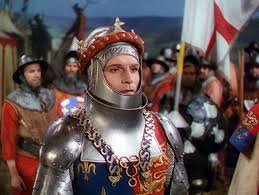Henry V, the Curtain, Shakespeare and the Manipulation of History
Talk on the subject of Henry V, the Curtain, Shakespeare, and the Manipulation of History, by James Wright
18 April 2016, MOLA, Mortimer Wheeler House, 46 Eagle Wharf Road, London, N1 7ED
Review by Jamie Weisz, MA Early Modern History

Laurence Olivier as Henry V, 1944
“If you want to learn about current affairs, go and see a Shakespeare history play.” This was the advice James Wright, resident Built Heritage Specialist with the Museum of London Archaeology team, told us before his talk on Shakespeare’s revered historical play, Henry V. As part of MOLA’s Shakespeare 400 events programme, Wright unpicked the history behind the play, both in terms of its historic content and the context in which it was written.
First, an account of Henry’s military career. Henry’s early experience of battle was not a pleasant one. When he was just sixteen years old, Henry took an arrow to the face at the Battle of Shrewsbury (1403), which left him with significant physical and mental scarring. This traumatic experience, Wright argued, significantly contributed to Henry’s ruthless character. Countless incidents, such as Henry’s decision to allow 12,000 townspeople to starve to death between the city walls and Henry’s army at the Siege of Rouen, helped paint a picture of Henry as a cruel, merciless leader. This was the man, after all, who proclaimed that 'war without fire is like sausages without mustard'! Wright also explained in great detail the proceedings and long-term outcomes of Henry’s Agincourt campaign, confirming and dispelling various stories surrounding the infamous battle.
Whilst 'Henry V' is an historical play, Shakespeare managed to make the play relevant to the sixteenth century. 'As in good time he may, from Ireland coming, Bringing rebellion broached on his sword' – These words from the Act V prologue, Wright argued, clearly pointed towards the Earl of Essex, Lord Lieutenant of Ireland who had defied the Queen’s orders and returned to London that year. Such signposting sets the composition of the play against a backdrop of national anxiety towards the Nine Years War, and made the work potentially volatile. Indeed, as Wright pointed out, printed folio versions of the play were censored in the early seventeenth century to exclude references to political events.
Recent productions of 'Henry V', like Shakespeare’s original, strongly reflect the times in which they are performed. Wright concluded the talk by taking us through modern adaptations of Henry V. For instance, Laurence Olivier’s renowned 1944 production coincided with the latter stages of the Second World War, with extravagant scenes and settings designed to instil patriotic zeal in all Englishmen. By contrast, Kenneth Branagh’s gloomy 1989 version echoes apathy towards warfare in post-Falklands Britain, perhaps closely capturing Shakespeare’s original sentiments. Such considerations demonstrate how versatile 'Henry V' is, and how Shakespeare’s work still evokes national sentiment.
With impressive knowledge of medieval and Tudor history, as well as a good understanding of Shakespeare’s work, Wright was able to convincingly explain how 'Henry V' was a product of its time. Despite a disappointingly low turnout, James Wright's talk was exceptionally informative and insightful. The rest of the MOLA lecture series certainly will be an exciting prospect.

